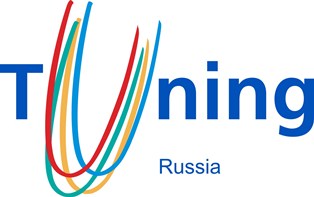
International Education and Tuning Center
International Education and Tuning Center was opened in 2013. It is one of 12 Tuning Centers created in the framework of Tuning Russia Project.
MISSION
Tuning methodology implementation at the levels:
· local - university study programmes design and delivery;
· regional and national by networking with other regional and Russian institutions on study programmes design and delivery;
· international - double diploma and joint study programmes design and delivery.
Tuning
The “Tuning Russia” project has been launched in October (2010-2013) and is finalized now with important results, such as:
- The reference points in the following nine subject areas: Ecology, Economics and Management, Education, Environmental Engineering, Information and Communication Technologies, Languages, Law, Social Work and Tourism.
- Skilled experts team in modernization of educational programs.
- The chain of Tuning Centers in Russia Federation affiliated with Tuning World Academy and Tuning Centers in African countries, Latin America and other regions.
AIMS
- Networking cooperation and institutional partnership with Tuning Academy and Tuning Centers, European and Russian universities;
- Tuning methodology and best European practices dissemination;
- Modules and courses based on Tuning methodology implementation;
- Methodological support for double degree and joint programmes realization.
Tuning Methodology
The Tuning approach proposes a methodology to (re-) design, develop, implement and evaluate study programmes for each of the higher education cycles (bachelor and master). Furthermore, Tuning serves as a platform for developing reference points at subject area level. These are relevant to making study programmes comparable, compatible and transparent. The agreed-upon reference points for subject areas and their degree programmes are expressed in terms of competences and learning outcomes
TUNING-ALGORITHM OF CREATION OF EDUCATIONAL PROGRAM
1. Confirm the existing social need for the programme and define the programme profile.
2. Describe programme objectives and identify the key competences (generic and subject-specific) it should develop.
3. Identify and formulate measurable learning outcomes that should demonstrate that the graduate has developed the competences.
4. Design and describe the programme contents and structure (modules and credits).
5. Check the correspondence among the programme structure, the learning outcomes and the key competences.
6. Select approaches to teaching and learning as well as methods of assessment in line with the competences to be developed.
7. Develop an evaluation and quality assessment system.
Reference Points
The Reference Points are recommended provisions and can be used in the design of educational programmes in the various areas of training in this subject area. In the Reference Points, the results of the survey of employers, graduates, teachers and students are represented. This survey aims to determine the importance of the competences of graduates.
The Reference Points include the description of the strategies, methods, technologies, training and organization of independent work of students, the specific content of which is connected with the professional activity and the trends of modern tourism education.
In Reference Points great attention is paid to the description of the assessment tools of students’ learning outcomes in the context of a competence-based approach to Higher education.
Information and Communication Technologies, Environmental Engineering, Education, Interpreting and Translation, Foreign Language, Social Work, Tourism, Ecology, Management, Economics, Law
Presentations
September, 28, 2016 Training workshop “Quality Assurance of Study Programmes in the European Higher Education Area”
Online documentation of the quality assurance of study programmes
Mechanisms of Quality assurance European trends, formats and technologies
September, 21 – 22, 2016 Training workshop “Validation of non-formal/informal Learning”
Staff to perform recognition (skills), examples from European universities, challenges
Introduction to conceptual aspects to validation of non-formal and informal learning EU practices including legal framework (European, national, institutional)"
May, 20, 2016 Training workshop “European approach to study programmes development” by prof. D. Kennedy (University College Cork, Ireland)
How do we design Programmes at Third Level using Learning Outcomes within the Bologna Framework?
March, 23-24, 2016 Training workshop “Master and PhD competence-based programmes development” by prof. A. Vickers (University of Essex, England)
Publications by prof. D. Kennedy
Learning Outcomes and Competences
Learning Outcomes, Degree Profiles, Tuning Project and Competences
Making programme learning outcomes explicit for students of process and chemical engineering




